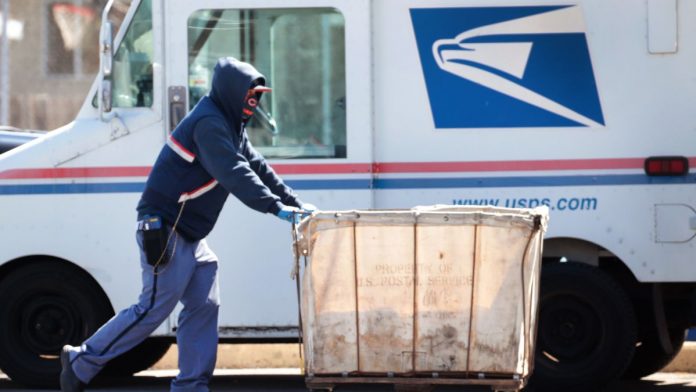
Democratic senators warned Friday that controversial changes to U.S. Postal Service procedures have raised concerns in Washington about the timely delivery of mail-in ballots ahead of the November election.
Earlier this month, Postmaster General Louis DeJoy approved a controversial cost-cutting operation at the USPS, which Congress re-imagined last century as a hybrid government-corporation. In lieu of federal funding, the postal service, which traces its roots back to the Federalist Era, would sustain itself via its own revenue sources, none of which are today capable of covering costs. DeJoy, who assumed office last month after 30 years as CEO of a North Carolina-based logistics firm, says immediate changes and others to come are intended to resolve years’ worth of operating deficits that have left the agency more than a hundred billion dollars in debt.
An internal document obtained by the Washington Post shows that DeJoy has placed greater emphasis on schedule and punctuality, telling carriers to “leave for the street on time, and return on time.” A direct consequence of this, the July 10 memo to employees says, is that carriers may “temporarily” see “mail left behind or mail on the workroom floor or docks,” which it adds is “not typical.”
DeJoy, whose past as a major GOP donor and fundraiser for President Trump has rubbed many the wrong way, has portrayed the USPS as a “broken business model,” saying in a statement this week that an inability to balance costs with available funding has led the agency to face “an impending liquidity crisis.” The agency, which conservatives have long sought to privatize, is widely projected to become insolvent this year. Nevertheless, Federal lawmakers are questioning the sanity of implementing any drastic changes amid the ongoing covid-19 pandemic and only months before a national election.
“Recent concerns raised by constituents and postal workers have brought to light questionable changes under your leadership now taking place in post offices and processing centers across the nation that may negatively impact mail delivery,” read a letter to Postmaster General DeJoy from four U.S. senators on Friday. (The letter was cosigned by Senators Gary Peters, Amy Klobuchar, Chuck Schumer, and Tom Carper — of Michigan, Minnesota, New York, and Delaware, respectively.)
G/O Media may get a commission
The letter coincides with a Washington Post report describing nationwide “days-long backlogs of mail,” which it said is “alarming” postal workers and union officials, whom the paper describes as fearful that DeJoy’s new protocols could “undermine their ability to deliver ballots on time for the November elections.”
Already, at least 65,000 absentee or mail-in ballots have been rejected this year because they arrived past the deadline, an NPR analysis found, “often through no fault of the voter.” Although the pandemic has greatly exacerbated the USPS’s financial troubles, the White House in June threatened to veto a coronavirus relief package if it included any money for the agency, which employs more than 630,000 workers.
The American Postal Workers Union did not immediately respond to a request for comment.
One Democratic aide told Gizmodo that lawmakers, including those with oversight jurisdiction, did not have a complete understanding of what has transpired at the USPS since DeJoy’s arrival. The changes have been described to them only in ambiguous terms, such as “operational efforts,” and it was unclear what timetable DeJoy was operating under, they said.
The letter sent Friday includes seven questions that speak to just how little the U.S. senators know, such as: “Did you discuss these operational changes, or any other operational changes, with Administration officials outside the Post Office?” The letter asserts DeJoy did not consult “meaningfully” with any representatives of the postal union or any other “mail industry stakeholders.”
“It is essential that the Postal Service not slow down mail or in any way compromise service for veterans, small businesses, rural communities, seniors, and millions of Americans who rely on the mail—including significant numbers who will be relying on the Postal Service to exercise their right to vote,” the letter says.
USPS spokesman David Partenheimer said in an email that the agency was “vigorously focusing on the efficiency” of its operations as part of a broader strategy to make the agency financially stable. “Of course we acknowledge that temporary service impacts can occur as we redouble our efforts to conform to the current operating plans, but any such impacts will be monitored and temporary as the root causes of any issues will be addressed as necessary and corrected as appropriate,” he said.
Partenheimer said the agency would “continually review” its practices and adjust them, when required, “to ensure that we operate in an efficient and effective manner.” He also sought to emphasize that DeJoy was appointed by the Postal Service Board of Governors, and not the president, as others, he said, had falsely reported.
Sen. Klobuchar, who cosigned the USPS letter, remains concerned about the potential for the changes to undermine the integrity of elections nationwide, a spokesperson said.
President Trump, meanwhile, floated the idea on Thursday that the November election could be delayed because, he said on Twitter, expanding mail-in ballots due to public covid-19 concerns would cause the “greatest election disaster in history.” In the New York Times, the co-founder of the powerful conservative legal group the Federalist Society, a Trump ally, called the tweet “fascistic,” adding it was “itself grounds for the president’s immediate impeachment again.”
Sen. Ron Wyden told Gizmodo on Friday that he was growing increasingly concerned about efforts to undermine faith in mail-in ballots and the elections in general.
“The fact that [Trump] is pushing unconstitutional fantasies like changing election day makes clear how desperate he is to cling to power,” Wyden said. “Every elected official needs to make clear that Trump’s transparent attempts to overthrow our democratic systems are totally unacceptable. And Americans in vote-by-mail states can protect against sabotage by voting as early as possible, or returning ballots at drop boxes.”
